- HubPages»
- Technology»
- Computers & Software»
- Computer Science & Programming»
- Programming Languages
8 Php Web Development Frameworks to Use in 2020
PHP, Hypertext Preprocessor, is an open-source server-side scripting language used by over 80 percent of websites and applications around the world. Designed to easily embedded in HTML, it lays a solid foundation to develop dynamic, secure, and sophisticated web apps.
When it comes to custom website development and functional programming style, developers can choose from a large variety of PHP frameworks. These frameworks support compact, defined data structures, offer greater database diversity, and come with a vast library of code and functions. With an ever-growing range of options for PHP frameworks, it’s critical to find and select the right platform for your app and website to be built around.
In this article, we have shortlisted and explained the top 8 PHP frameworks that could be the best fit for your next project.
Symfony
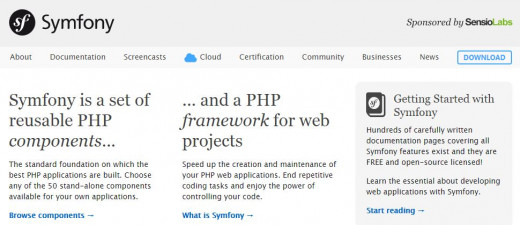
Symfony is one of the most popular and oldest PHP frameworks which follows all the web standards and PHP in a precise manner. This platform offers the most reliable and mature website development services for building complex and high-end web apps. In this, developers and users can reuse the code and components and compile with other design patterns. Instead of accessing and installing all the components and libraries at once, you can only download and use directories and elements you need. Symfony PHP framework is an ideal choice for the designing and development of large-scale enterprise-level solutions and high-performance, scalable websites efficiently.
The Symfony development team maintains comprehensive and extensive documentation to keep the communities engaged while helping users understand proper methods and discover the best practices associated with this framework. The reusable and decoupled PHP libraries, including routing, creation, templating, validator, and authenticator, simplify various web app development tasks. Compared to other PHP frameworks, the Symfony platform offers long-term support releases and more bundles.
GitHub Stars: 22.5k
Cake PHP
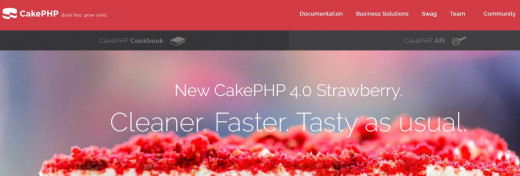
CakePHP is an open-source framework that is gaining more and more attention due to its reliable features and advanced functionalities. As of now, this robust platform improves speed, reliability, and security in web apps and lives under the hood of thousands of websites and commercial web solutions. It supports code generation and offers built-in components, such as caching and authentication and scaffolding functionality, which helps to create visually appealing and interactive websites and speeding up the entire web development process. CakePHP framework provides the developer with a variety of useful packages to handle various jobs and standard functionality you want a PHP platform to manage. Laden with dedicated security features and privacy-preserving measures, it secures your website and data against malicious, potential threats, including cross-site scripting (XSS), SQL injects, and CSRF. Its powerful features like exhaustive documentation, form validation tools, appropriate support portals, and proper object inheritance speak in favor of this framework for developing and deploying apps.
Because CakePHP is 100% backward or downward compatible, it effectively eliminates the need to start coding from scratch and makes the product instantly upgradable. Furthermore, it adheres to the MVC approach and CRUD (Create, Read, Update, and Delete) paradigm, which enables the construction of stand-alone libraries and web apps without a steep learning curve.
GitHub Stars: 8.1k
Laravel
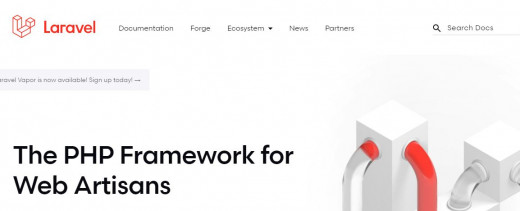
Laravel framework is the definite leader in the PHP web development world. This open-source, reliable PHP framework uses an MVC pattern and is molded after the concepts of Symfony for back-end web app development. Laravel platform introduces an enormous ecosystem and readily available tools like Artisan to develop apps with scalable, robust backend systems and perform tedious, intricate programming operations. By setting up and using a pre-wrapped Vagrant box, developers can easily install and run Laravel while lowering the environment setup time. This PHP framework offers a high degree of customization for websites, apps, or software developed on it, whether it’s a small or highly-scalable app.
With Laravel, you get a plethora of features and tools that allow you to customize and maintain complex projects and reach high flexibility. For instance, here’s a list of features you can use with this framework: MVC architecture support, RESTful controllers, seamless data migration, routing, authentication, and view template engine. By effectively handling various tasks, including caching, validation, sessions, and even broadcasting, Laravel simplifies the custom web app development process. Furthermore, it’s easily expandable and quite adaptable to third-party platforms, plugins, and libraries. Its comprehensive packaging systems, soup-to-nuts unit testing, and powerful ORM make it a go-to PHP framework for B2B website development.
GitHub Stars: 56.8K
Yii framework

Yii is a scalable, component-based PHP framework that follows the MVC paradigm and the principle of DRY (Don’t Repeat Yourself), enabling the user to develop dynamic, high-performance web applications. Yii framework is popular among developers and web app development companies as it offers enhanced security features and produces light-weight and more proficient codes. This framework is backed up by a large, diverse community of developers who are always willing to provide assistance and help during any web development project. A core team works continuously together to make improvements and strengthen the developers’ codes and development work. It emphasizes execution speed, loading time, performance, and efficiency by employing the lazy loading technique, which makes it faster than other of the available PHP frameworks.
Yii platform supports all types of web app development rapidly, and thus, is known as a universal web programing PHP framework. Besides, it allows the developer to customize nearly every piece and part of the core code. It provides a built-in authentication feature and code generation tool, Gii, and can be easily integrated with third-party components. It also offers high-level support for AJAX and form validation, making it easier and seamless for the user to develop out-of-the-box Ajax-driven apps with minimal hassle. Some of the main features of Yii are strong security, internationalization, caching, record implementation, integrated authentication and authorization, JQuery and AJAX support, and error handling.
GitHub Stars: 13.3k
Codeigniter

Codeigniter is an effective, lightweight PHP framework that has been around for over 13 years. Because of its small file size, Codeigniter makes the process of coding simpler while speeding up web development. A simple setup procedure and ease of use are two significant reasons why this web development framework is ideal for even beginners. It offers several advanced features and an extensive library that can be accessed through a simple interface. With this framework, you can build dynamic and high-end web solutions at high speed with minimal use of code. The approach to handling specific development operations using different components enables developers to build fast, highly-featured, and scalable web apps. Some of the key features and benefits of the Codeigniter framework include - unit testing, sessions, small learning curve, community support, data abstraction, high speed and performance, web app and database caching, and built-in security practices.
GitHub Stars: 17.8k
Zend framework
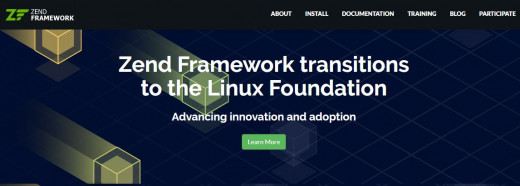
Zend is an object-oriented, open-source framework implemented in PHP 7 for developing high-performance web apps. It’s a go-to professional, enterprise-level framework that can successfully fulfill performance, extensibility, and security requirements. It offers various advanced features and components such as interfaces, packages, and inheritance that support extendibility and is compatible with all the PHP standards.
Zend framework can be easily integrated with different external and third-party libraries and allows you to use elements and include project-specific functionalities you need in your web app development project. The key features include simple cloud API, advanced MVC implementation, session management, flexible URI routing, and data encryption. Furthermore, the Zend platform supports RESTful API development and multi databases, like SQLite, MYSQL, and PostgreSQL. It also offers radical security features including barcode, defined routing, Cryptography tools, CSRF, authentication, validation, RSS feeds, and database abstraction layer.
GitHub Stars: 5.7k
Fuel PHP
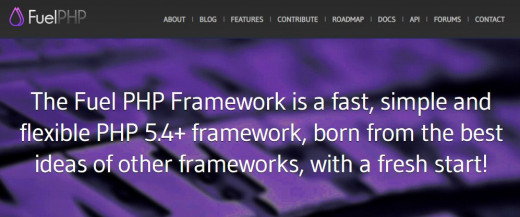
FuelPHP is one of the most highly trending and modern open-source web app framework written in PHP. This community-driven framework is flexible and simpler to use and demonstrates compatibility with PHP7. FuelPHP framework follows Hierarchical-Model-View-Controller architectural design and can also work with PHP 5.3+. It consists of ViewModel, a hidden and communication layer, between the controller or domain logic and view or presentation layer. Employing the principles of modularity, reusability, and extendibility in this framework allows web development companies and developers to develop and deliver large-scale and full-fledged web app solutions. FuelPHP offers various significant features such as RESTful implementation, potential risks as well as vulnerability protection, routing, URL filtering, caching, output encoding, and HMVC pattern. It also supports template parsing and ORM and lets developers employ several third-party packages that can extend their capabilities dramatically.
Github rating: 1.4k
Phalcon
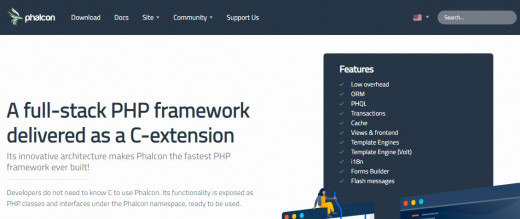
Introduced in the year 2012 and built on C and C++, Phalcon is considered as an extension of PHP based on the MVC paradigm. As opposed to other PHP frameworks, Phalcon offers cutting-edge execution speed and performance while consuming low resources like CPU and memory. That’s one of the reasons why experts believe that the Phalcon framework will be one of the most preferred choices of web app development in the future. Since it’s constructed on the C-extension module, this MVP web app development tool offers a tremendous speed to process HTTP requests and eliminates the need for learning C before using it. With its impressive, endless features and components, including asset management, universal autoloader, routing, queue, config, and caching, you can create both high-performance, high-end web apps and RESTful APIs quickly, easily.
If what you are looking to develop is highly configurable apps with faster execution speed and minimal use of resources, this framework might be ideal for you. One of Phalcon’s best features and benefits is that it provides the user with several data storage and database tools, including ORM, PHQL, and Object-Document Mapping (ODM) for MongoDB. Phalcon also provides support for international languages and allows you to utilize the specific libraries and modules based on the functionalities and features you want in your project.
Github rating: 10k








